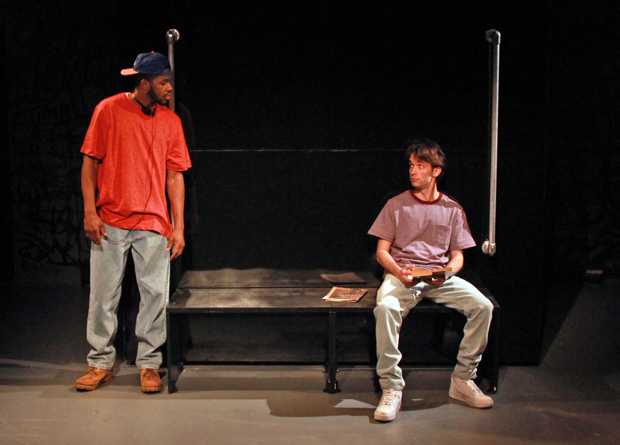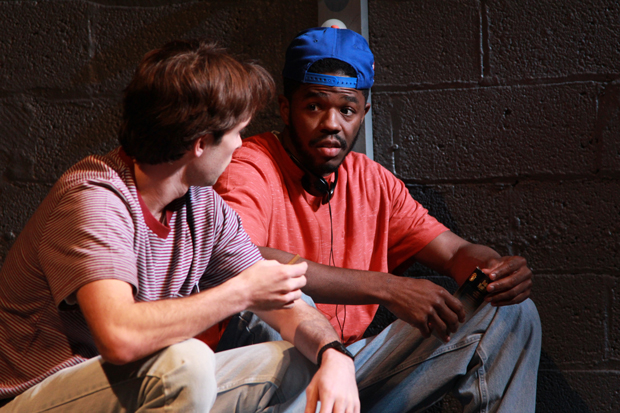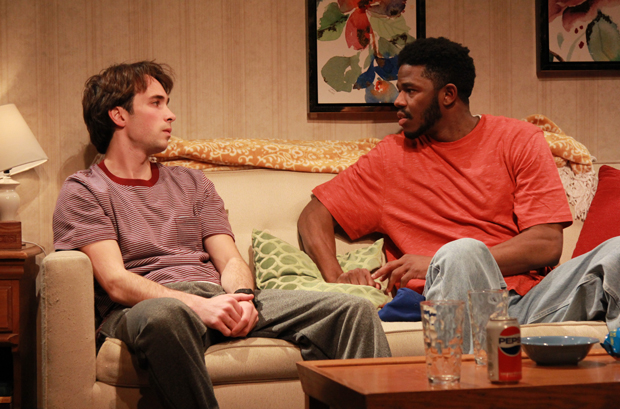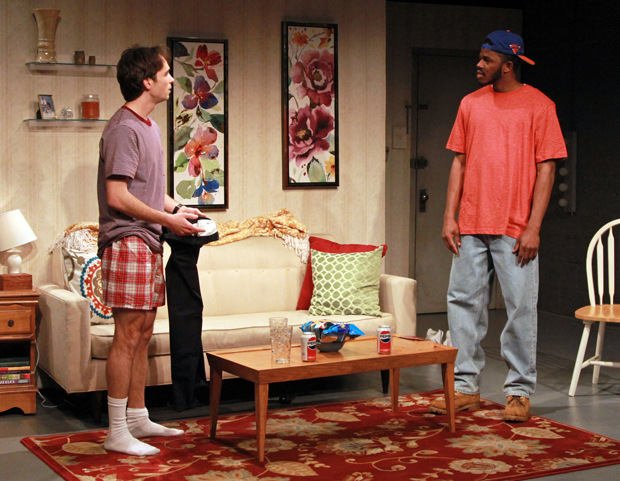A Random, Life-Changing Encounter on a Train in Dutch Masters

(© Spencer Moses)
On the surface, the title of Greg Keller's new two-character play Dutch Masters — currently making its New York premiere at the Wild Project thanks to Partial Comfort Productions — refers to the brand of cigar Eric (Ian Duff) shares with Steve (Jake Horowitz) during their several hours together after they meet randomly on a Bronx-bound D train one day in 1992 in New York City. Eric, who's black, initially believes the "masters" of the name implies "slave masters," a notion that Steve, who's white, is quick to correct when he notes that it most likely refers more to Dutch painters like Rembrandt (whose painting "The Syndics of the Drapers' Guild" graces boxes of Dutch Masters cigars), and that he doesn't believe the Dutch ever owned slaves. It's an understandable bit of bewilderment for Eric, though, indicative of the kind of cultural confusion that animates Keller's drama, a concise yet impactful work that manages to pack in a lot about troubled race relations in the US in a roller-coaster-like 70 minutes.
The title also recalls Amiri Baraka's 1964 play Dutchman, on which Keller's drama could be considered a modernized all-male riff. Instead of a white woman engaging in confrontational conversation with a black man, though, here it's Eric who suddenly strikes up a conversation with a clearly uncomfortable Steve, first seen reading a sci-fi book on a bench behind a black wall that makes up the center third of Jason Simms's spare set design. Much of the play's suspense comes from witnessing the moment-by-moment push-pull of this odd-couple relationship, as Steve gradually warms up to the overemphatic Eric, to the point that he eventually finds himself in Eric's own apartment after having smoked a joint with him on the street.

(© Spencer Moses)
Dutch Masters scintillates as a character study, with Keller showing a gift for planting telling detail in lines of dialogue in ways that don't come off as overly heavy-handed. All Keller needs, for instance, is a moment in which Steve takes the baton from Eric in an impromptu rendition of A Tribe Called Quest's "Can I Kick It" to indicate to us in the audience just how much Steve has absorbed black culture — a fact that both delights and disturbs Eric, who frequently hints at a troubled past and present that the more privileged Steve clearly hasn't experienced. Ian Duff and Jake Horowitz's performances are especially vivid in highlighting the contrasts between the two characters, with Duff's alternately charismatic and terrifying extroversion bouncing off Horowitz's general nervous anxiety.
Not that subtlety is everything in this play. Dutch Masters has a midpoint twist that recontextualizes both characters' behavior and fuels tensions between the two that come to a head in its harrowing climax. Such "gotcha" gimmickry is a bit jarring in a production that is otherwise noteworthy for its naturalism and attention to human detail. But if you're willing to suspend disbelief, the twist does intensify Keller's nuanced view of race relations and his desire to force his characters, and by extension us in the audience, to face one's own cultural assumptions.

(© Spencer Moses)
Steve may claim to be inclusive in his cultural tastes and lifestyle, but Eric frequently calls him out for acting in a fearful manner around him that implies ingrained racism. And yet, Eric comes off less as a grim truth teller than as a deeply angry individual whose understandable resentment toward white people nevertheless threatens to derail any attempts at reconciliation. Perhaps the highest compliment that can be paid to Dutch Masters lies in the way we find our sympathies for both characters changing throughout, the foundation shifting beneath our feet the same way Simms's set shifts on a dime from a graffiti-ridden MTA train car into the relative calm of Eric's white-walled, photo-laden apartment.
Moonlight and Jitney star André Holland makes his directorial debut with Dutch Masters, and it's perhaps no surprise that his direction of Duff and Horowitz prove to be his strongest suit. That is, however, not to undersell the impressive technical aspects of this modest production, especially Daniel Kluger's sound design, which infuses the show's first half with an atmospheric sense of place through moving-train sounds, authentic-sounding MTA announcements, and ambient natural outdoor noises. All of these elements disappear throughout the second half before a simple, forebodingly deep drone underscores the play's climax. But it's Eric and Steve who are at the heart of Keller's play, and through Duff and Horowitz, Holland is able to generate a dam of painful feelings swelling up until it bursts at the end. Dutch Masters is not only a viscerally gripping experience, but also a thought-provoking one, bound to inspire reflection long after its immediate intensity has worn off.

(© Spencer Moses)










